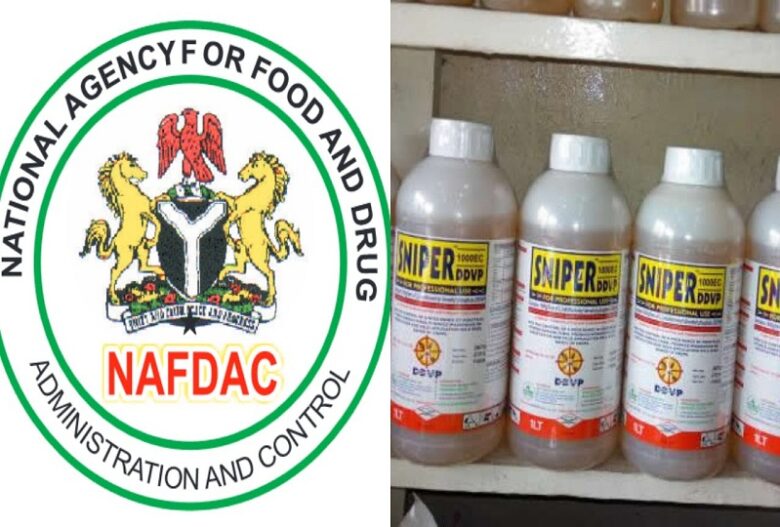Nigeria’s National Agency for Food and Drug Administration and Control (NAFDAC) has reiterated its warning to Nigerians regarding the hazardous practice of using harmful chemicals to preserve food items, emphasising the risks associated with Dichlorvos, a commonly used chemical by traders for food preservation.
In a statement released by Resident Media Consultant to NAFDAC, Sayo Akintola, the agency expressed concern over a viral video depicting the use of dangerous chemicals, such as Dichlorvos, to preserve food items like beans, stockfish, and crayfish.
NAFDAC emphasised that the sale of small volume dichlorvos (100 ml or less), sold as Sniper®, has been banned since 2019, while the sale of the larger volume (one litre) is restricted to certified agrochemical outlets. The agency underscored the toxicity of dichlorvos to human health, warning of fatal consequences associated with its use.
Director General of NAFDAC, Prof. Mojisola Adeyeye, urged traders and merchants to refrain from using unauthorised chemicals on food intended for human consumption. She highlighted the significant risks posed by the misuse of Dichlorvos, including short-term and long-term health implications such as developmental abnormalities, memory loss, reduced fertility, and potential carcinogenic effects.
Dr. Rametu Momodu, Director of Veterinary Medicine and Applied Products (VMAP) at NAFDAC, reiterated that the use of certain chemicals, particularly pesticides, to protect grains and prevent weevil infestation in beans is not approved. She emphasised the importance of using approved pesticides as fumigants according to the manufacturer’s specifications, cautioning against direct application to food due to inherent health hazards.
Momodu warned of the adverse effects of consuming food contaminated with dichlorvos, which include dizziness, vomiting, difficulty breathing, tremors, convulsions, and in severe cases, coma and death. She emphasised that pesticide residues remain on or in the food even after washing, posing significant health risks.
NAFDAC urged grain merchants, market vendors, and farmers to adhere strictly to manufacturer guidelines and refrain from directly applying dichlorvos to foodstuffs. Adeyeye emphasised the importance of alternative methods for preserving food, such as bio-pesticides, as safer options than Dichlorvos.
In addition to banning the 100 ml size bottle, NAFDAC has implemented various initiatives, including stakeholder sensitisation meetings, laboratory testing to ensure pesticide residues are within acceptable limits, and routine monitoring of stakeholders to ensure compliance with regulations.
Adeyeye reiterated NAFDAC’s commitment to global best practices, including the phase-out of certain pesticides banned in other countries due to proven toxicity. She emphasised the importance of transitioning to safer alternatives and encouraged reporting of vendors using harmful practices to the nearest NAFDAC office for appropriate sanctions.
YOU MAY ALSO READ: Donald Trump joins TikTok, racks up 32 million views









Got a Question?
Find us on Socials or Contact us and we’ll get back to you as soon as possible.